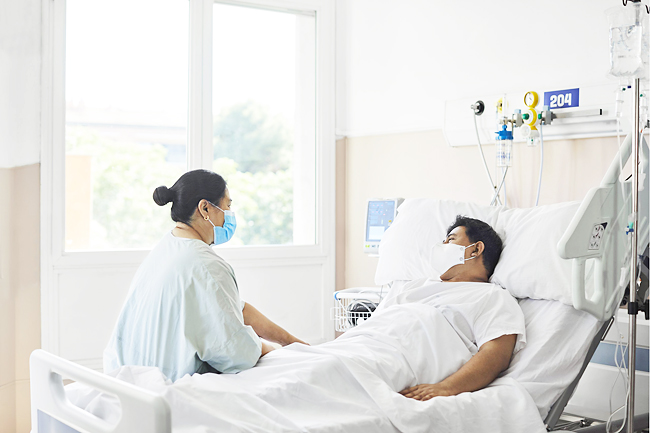James Kon
Following the announcement of the latest amendments to the COVID-19 control measures which took effect on February 15, the Ministry of Health (MoH) released a policy update for patients and visitors at government and private hospitals, health centres and health facilities.
Patients and visitors at all government and private hospitals, health centres and health facilities are still required to wear facemasks.
The use of face mask is only mandatory in clinical areas when in the premises of a hospital, health centre or health facility.
Clinical areas refer to places where encounters between healthcare workers and patients occur.
Among them are the Emergency Department, registration counters, wards, clinics, pharmacies, operating theatre, radiology and adjacent waiting areas and corridors close to wards or where medical procedures, treatment and consultation are conducted.
The canteen or restaurant/cafe, pantries or rest areas for health workers, surau, office, lecture theatres and meeting rooms are not categorised as clinical areas.
Visitors are no longer required to perform an ART screening before visiting patients at hospital, although is encouraged.

ART screening will conducted for patients being admitted to the hospital. Patients with COVID-19 will be treated at designated isolation wards. However, there are certain areas still requiring patients to perform an ART screening.
ART screening is required for outpatients receiving treatment or procedures, such as Emergency Department; patients with severe/serious pain who likely require admission to the hospital, as well as patients with influenza like-illness (ILI) such as flu and cough.
This also applies for patients undergoing endoscopy, dental procedures, surgery at the operating theatre and at high risk areas such as the Chemotherapy Unit, Haematology Unit and Flu Clinic.
Patients can contact their clinics to reschedule appointments if they test positive with COVID-19.
In the latest policy update, the MoH also stated that in avoiding the risk of infection and to ensure that patients admitted to the ward get adequate rest and receive timely care and treatment, only two designated visitors (excluding the carer) are allowed to visit per session during visiting hours.
Meanwhile children under the age of 12 are not allowed to enter the ward/unit. Visitors are only allowed to visit patients in low risk zone wards (cold zone wards).
Visitors are not allowed to visit patients in holding wards, isolation wards or any wards with restricted access. Visitors are allowed to make video calls with family members with the patient’s consent.
However, video recordings of hospital staff or other patients at the wards is strictly prohibited.
Only one visitor is allowed to accompany a patient for appointment/medicine collection.
All visitors must ensure that they wear facemasks at all time and keep their voices down.
The ministry also reminded visitors to wash their hands with soap and water or use hand sanitiser before and after visit, keep their mobile phones switched off or on silent mode and not visit patients if they are unwell or sick.
It is important to respect the privacy of other patients and refrain from eating and drinking inside the ward.
Only one carer per patient is allowed inside the ward. Any changes on the carer for each patient is allowed on the condition that the replacing carer needs to do an ART.
COVID-19 patients are not allowed to receive routine procedures such as dental treatment.
However, COVID-19 patients experiencing worsening symptoms can seek treatment at the hospital or health centres and should inform healthcare staff that they test positive for COVID-19.
For information, the public can call Talian Darussalam 123 or visit the website www.moh.gov.bn or follow MOH’s social media: @mohbrunei.


